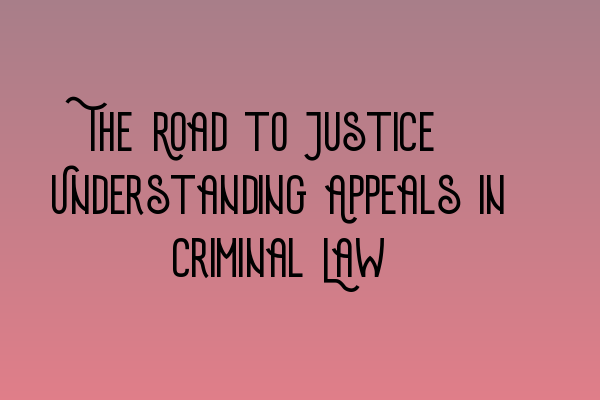The Road to Justice: Understanding Appeals in Criminal Law
When it comes to the judicial process, ensuring fairness and justice is of utmost importance. In criminal law, where individuals’ lives and liberties are at stake, the avenue for appeals plays a crucial role in ensuring justice is served. In this article, we will delve into the intricacies of appeals in criminal law, helping you understand the process and its significance.
Understanding Appeals
An appeal in the context of criminal law is the process through which a convicted individual seeks a review of their case to have a conviction or sentence overturned, modified, or remitted. Appeals provide an opportunity for the court to rectify any errors or inconsistencies that may have occurred during the initial trial.
There are different grounds for lodging an appeal, including:
- Incorrect application of the law
- Procedural errors
- Insufficient evidence
- New evidence
Appeals typically take place at a higher court, such as the Court of Appeal, where a panel of judges reviews the case and makes a decision based on the presented arguments and evidence.
The Appeals Process
The appeals process consists of several stages, each playing a crucial role in ensuring a fair and thorough review of the case. Let’s take a closer look at the key stages:
- Notice of Appeal: The convicted individual, or their legal representative, files a notice of appeal, outlining the grounds on which they are appealing.
- Preparation and Filing of Appeal Documents: The appellant prepares and submits the necessary appeal documents, including the appellant’s notice, skeleton arguments, and bundles of authorities.
- Respondent’s Arguments: The respondent, usually the prosecution, has an opportunity to respond to the appeal, presenting counter-arguments and supporting evidence.
- Oral Hearing: The court holds an oral hearing where both parties present their arguments before the panel of judges.
- Judgment: The court delivers its judgment, either allowing or dismissing the appeal.
It’s important to note that the appeals process can vary depending on the jurisdiction and the specific circumstances of the case.
The Significance of Appeals
Appeals serve as a vital mechanism to rectify any miscarriages of justice that may have occurred during the initial trial. They provide an opportunity for individuals to challenge their conviction or sentence based on legal errors or new evidence.
By allowing appeals, the justice system demonstrates its commitment to fairness, ensuring that every individual has the right to a fair and just trial. Appeals also contribute to the development and evolution of case law, setting precedents and clarifying legal principles.
If you’re interested in learning more about criminal law, SQE 1 Practice Exam Questions and SQE 1 Practice Mocks FLK1 FLK2 can provide you with valuable resources for building your knowledge and skills.
For those aspiring to become legal professionals, SQE 2 Preparation Courses and SQE 1 Preparation Courses can help you in your journey toward a successful legal career.
Remember, staying informed about the latest legal developments and understanding the appeals process in criminal law is essential for upholding justice and ensuring the rights of all individuals are protected.
Stay tuned to our blog for more insightful articles and updates on SRA SQE Exam Dates.
